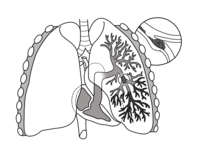
Photo from wikipedia
BACKGROUND There is a paucity of data available on hospitalization and length of stay (LOS) for different anticoagulant therapies. We sought to compare and summarize admission rates and LOS, and… Click to show full abstract
BACKGROUND There is a paucity of data available on hospitalization and length of stay (LOS) for different anticoagulant therapies. We sought to compare and summarize admission rates and LOS, and describe the frequency of reporting these two outcomes in randomized control trials (RCTs) comparing different anticoagulant therapies for venous thromboembolism (VTE). METHODS A literature search was conducted from inception to August 15, 2016 on RCTs of anticoagulant therapy for patients with VTE. Study selection, data extraction and risk of bias analysis were done by two reviewers independently. Meta-analyses were conducted for admission rates and LOS. RESULTS A total of 4064 articles were identified. There were 74 articles of 70 studies included in the analysis. Hospitalization rates and LOS were reported in 13 (18.6%) and 12 (17.1%) of the 70 included studies, respectively. Low-molecular-weight heparin (LMWH)-treated patients were 33.0% less likely to be admitted to hospitals compared to unfractionated heparin (UFH) (RR = 0.67, 95% CI [0.58, 0.78]). The mean difference in LOS between LMWH and UFH was 2.54 days in favor of LMWH (95% CI [-4.94, -0.14]). Compared to parenteral therapy, using rivaroxaban was associated with a lower admission rate for a difference of 1.4-5.1% in VTE, 2.5% in DVT and 0.2% in PE. The LOS of patients receiving rivaroxaban was significant shorter than the LOS in parenteral therapy group for a difference of 1-5 days in VTE, 3 days in DVT and 1 day in PE. CONCLUSION Admission rates were lower and LOS was shorter using LMWH compared to UFH and oral therapy compared to parenteral therapy for acute VTE treatment in RCTs, based on limited eligible RCTs. These crucial clinically relevant outcomes are underreported in the existing VTE clinical trials.
Journal Title: Critical reviews in oncology/hematology
Year Published: 2018
Link to full text (if available)
Share on Social Media: Sign Up to like & get
recommendations!